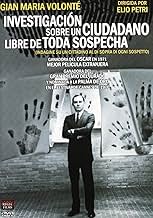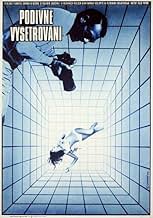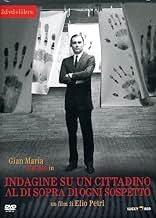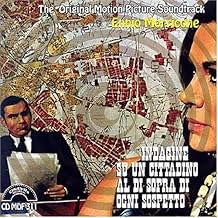Investigação Sobre um Cidadão Acima de Qualquer Suspeita
Título original: Indagine su un cittadino al di sopra di ogni sospetto
AVALIAÇÃO DA IMDb
8,0/10
14 mil
SUA AVALIAÇÃO
Um chefe de detetives da seção de homicídios mata seu amante e deixa deliberadamente pistas para provar sua própria responsabilidade pelo crime.Um chefe de detetives da seção de homicídios mata seu amante e deixa deliberadamente pistas para provar sua própria responsabilidade pelo crime.Um chefe de detetives da seção de homicídios mata seu amante e deixa deliberadamente pistas para provar sua própria responsabilidade pelo crime.
- Ganhou 1 Oscar
- 16 vitórias e 6 indicações no total
Enredo
Você sabia?
- CuriosidadesThe main character's name is never revealed.
- Citações
Il Dottore - Former head of homicide squad: The people are underage, the city is sick. Others are tasked with educating and curing this. Our duty is to repress it! The repression is our vaccine! Repression and civilization!
- Versões alternativasThe subtitled American version distributed by Columbia has slight differences in the credits. The Italian version opens with blank white-on-black credits (as many other Petri films do). The American version projects the credits onto the opening scene with the Dottore walking around the street. Both the opening and the closing credits (including the film's title and the Kafka quotation) are translated to English as well.
- ConexõesEdited into Colpiti al cuore (2019)
Avaliação em destaque
Authority, Order, Power, these are Law's three pillars. Law protects citizens and defends them against crime. Law is made of values and incarnated by men. Those men serve Law, serve citizens and the mission's nobility lies on the fact that it applies to anyone. That's the basis of democracy and the strength of Law. No one is above it. Therefore, in a fair system, anyone can be theoretically suspect. But, the weakness of Law is that it paradoxically implies the use of its main dual medium : repression and punishment which are, after all, the only way to protect the good citizens ... as potential victims. So let's say to make it simpler that Law has two arms, one holding a shield to protect the good citizens and the other holding a sword to punish the bad ones.
One man, called Il Dottore, is holding the sword. He was the former Head of Homicide Squad and leads now the Political Bureau of the Italian Security Court. His speech in the beginning of the film, clearly announces him as a man with palpable fascist tendencies, although the overuse of the word 'fascist' kind of weakens its meaning. This man, incarnated by Gian Maria Volonte, exults the value of a powerful state above any consideration of individual rights. The state must be powerful, authoritarian and any ideas that threaten Law and Order, should be mercilessly fought. It's too simplistic to call this 'fascism', some would say fascism was born in Italy, which would explain that the ideas of a man like Il Dottore could be impregnated by a certain fascist vision but they'd be forgetting that Italy is also the country of Machiavelli, and the whole plot of this psychological political thriller could be considered as a deep, Machiavellian character study.
Il Dottore is fascist in his beliefs and Machiavelian in his acts, two contradictions that totally cancel each other out and makes him more of a very interesting pathological case of egomania. The man wants to prove that the very system that maintains Law and Order, Police and Justice, is flawed because it ensures the existence of citizens beyond suspicion. This man wants to denounce the main obstacle, the thing that makes his job ethically useless. The mission sounds noble... except that the way he chose to prove his point is the act of a maniac. A crime to denounce, to make the point he himself incarnates, that there are some citizens above suspicion. So high above this suspicion that they can leave clues to denounce themselves without never being worried. Because people believe in men who incarnate order. Power's aura seems more efficient than its use. Power relies on its own abuse.
And that's the theme of the film. What is power? Il Dottore incarnates it with such charisma and virile magnetism that whatever comes off his mouth sounds like the truth. If he says he's guilty, it can't be anything but irony or sarcasm. The simple thought that he could be guilty of the crime he committed sounds like a blasphemy. Indeed, the power is a deified notion. And like the power of God is perceived in our everyday life, the same goes for Law. Order is real, and can't be based on abstraction. The paradox is that an abstraction is not palpable enough to be respected. Fear of punishment controls people more than interests, as said Machiavelli. Therefore, it is no surprise that socialism is considered as an escapism from individual interests and therefore can understand only one language : repression. Il Dottore handles the questioning of the left-wing activists just as if he had personal reasons to fight them, because they're the most likely people to legitimate the use of repressive violence.
Indeed, it is personal. Jealousy, weakness, humiliation, power is represented by men, who are flawed. This is a brilliant character study of a man using power as an artifice to disguise his weaknesses. He's the Law but he's a citizen, he's power and he's powerless. His interactions with his victim totally deconstruct the character, and extinguish the aura and prestige he incarnates for his men. With this woman, his authority is like the toy the little boy proudly shows. Power allows him to run a red light or share some gross crime-related experiences, so voyeur it sounds childish. They're big children but they have the power. So, whom the power belongs to ? Women? Anarchists? Who's the leader? the system ? No, what leads the world is only human judgment ... The truth is in its appearance and this is what guides human perception.
Il Dottore denounces these fallacious perceptions in such an original way, we also can't believe this man has this status and is so respected, which makes us question the legitimacy of some our leaders ... after all, men are men, and behind every great man, there's a woman, and who really knows how these so-called great men behave with these women? Gian Maria Volonte gives us a hint through an extraordinary performance. In the cinematic world of character studies, Il Dottore is a living paradox highlighting our own weaknesses as men who believe in a system of powers, or our owns for the luckiest ones. His charisma makes him all the more pathetic in some key scenes and his pathos more admirable in some others. Elio Petri's investigation is a fascinating political thriller whose introspectively paranoid feeling is sublimated by Ennio Morricone's score.
"Investigation of a Citizen Above Suspicion" is an intelligent masterpiece denouncing the paradoxical nature of Law where the holders of the sword tend to fight those who hide themselves behind the shield while the shield protects only those who use the sword. Gian Maria Volonte is the soul of this contradiction.
One man, called Il Dottore, is holding the sword. He was the former Head of Homicide Squad and leads now the Political Bureau of the Italian Security Court. His speech in the beginning of the film, clearly announces him as a man with palpable fascist tendencies, although the overuse of the word 'fascist' kind of weakens its meaning. This man, incarnated by Gian Maria Volonte, exults the value of a powerful state above any consideration of individual rights. The state must be powerful, authoritarian and any ideas that threaten Law and Order, should be mercilessly fought. It's too simplistic to call this 'fascism', some would say fascism was born in Italy, which would explain that the ideas of a man like Il Dottore could be impregnated by a certain fascist vision but they'd be forgetting that Italy is also the country of Machiavelli, and the whole plot of this psychological political thriller could be considered as a deep, Machiavellian character study.
Il Dottore is fascist in his beliefs and Machiavelian in his acts, two contradictions that totally cancel each other out and makes him more of a very interesting pathological case of egomania. The man wants to prove that the very system that maintains Law and Order, Police and Justice, is flawed because it ensures the existence of citizens beyond suspicion. This man wants to denounce the main obstacle, the thing that makes his job ethically useless. The mission sounds noble... except that the way he chose to prove his point is the act of a maniac. A crime to denounce, to make the point he himself incarnates, that there are some citizens above suspicion. So high above this suspicion that they can leave clues to denounce themselves without never being worried. Because people believe in men who incarnate order. Power's aura seems more efficient than its use. Power relies on its own abuse.
And that's the theme of the film. What is power? Il Dottore incarnates it with such charisma and virile magnetism that whatever comes off his mouth sounds like the truth. If he says he's guilty, it can't be anything but irony or sarcasm. The simple thought that he could be guilty of the crime he committed sounds like a blasphemy. Indeed, the power is a deified notion. And like the power of God is perceived in our everyday life, the same goes for Law. Order is real, and can't be based on abstraction. The paradox is that an abstraction is not palpable enough to be respected. Fear of punishment controls people more than interests, as said Machiavelli. Therefore, it is no surprise that socialism is considered as an escapism from individual interests and therefore can understand only one language : repression. Il Dottore handles the questioning of the left-wing activists just as if he had personal reasons to fight them, because they're the most likely people to legitimate the use of repressive violence.
Indeed, it is personal. Jealousy, weakness, humiliation, power is represented by men, who are flawed. This is a brilliant character study of a man using power as an artifice to disguise his weaknesses. He's the Law but he's a citizen, he's power and he's powerless. His interactions with his victim totally deconstruct the character, and extinguish the aura and prestige he incarnates for his men. With this woman, his authority is like the toy the little boy proudly shows. Power allows him to run a red light or share some gross crime-related experiences, so voyeur it sounds childish. They're big children but they have the power. So, whom the power belongs to ? Women? Anarchists? Who's the leader? the system ? No, what leads the world is only human judgment ... The truth is in its appearance and this is what guides human perception.
Il Dottore denounces these fallacious perceptions in such an original way, we also can't believe this man has this status and is so respected, which makes us question the legitimacy of some our leaders ... after all, men are men, and behind every great man, there's a woman, and who really knows how these so-called great men behave with these women? Gian Maria Volonte gives us a hint through an extraordinary performance. In the cinematic world of character studies, Il Dottore is a living paradox highlighting our own weaknesses as men who believe in a system of powers, or our owns for the luckiest ones. His charisma makes him all the more pathetic in some key scenes and his pathos more admirable in some others. Elio Petri's investigation is a fascinating political thriller whose introspectively paranoid feeling is sublimated by Ennio Morricone's score.
"Investigation of a Citizen Above Suspicion" is an intelligent masterpiece denouncing the paradoxical nature of Law where the holders of the sword tend to fight those who hide themselves behind the shield while the shield protects only those who use the sword. Gian Maria Volonte is the soul of this contradiction.
- ElMaruecan82
- 8 de jan. de 2011
- Link permanente
Principais escolhas
Faça login para avaliar e ver a lista de recomendações personalizadas
- How long is Investigation of a Citizen Above Suspicion?Fornecido pela Alexa
Detalhes
- Data de lançamento
- País de origem
- Idioma
- Também conhecido como
- Investigation of a Citizen Above Suspicion
- Locações de filme
- Empresa de produção
- Consulte mais créditos da empresa na IMDbPro
Bilheteria
- Faturamento bruto nos EUA e Canadá
- US$ 265.470
- Tempo de duração1 hora 55 minutos
- Mixagem de som
- Proporção
- 1.85 : 1
Contribua para esta página
Sugerir uma alteração ou adicionar conteúdo ausente

Principal brecha
By what name was Investigação Sobre um Cidadão Acima de Qualquer Suspeita (1970) officially released in India in English?
Responda






























